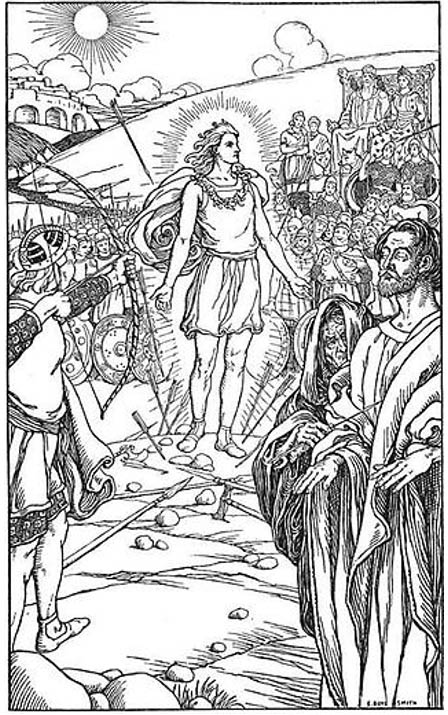
"Each arrow overshot his head" (1902) by Elmer Boyd Smith. Public Domain
Known among the pre-Christian Scandinavians, and the gods themselves, as the "Shining God", Baldr was the image of perfection in the Norse religion, and the pride and joy of the Æsir (members of the principal pantheon of deities). The second son of Odin and his wife Frigg, Baldr was beloved and adored by his fellow gods—in the minds of the Æsir, he could do no wrong and no wrong could be done to him. He was the husband of Nanna and the father of Forseti, and dwelt with them in his hall of Breidablik, located in the Norse equivalent of Heaven. Nothing unclean could exist in this realm, thus the highest of all courts existed here; with the aid of this skillful son, all judgments in Breidablik were absolute and pleasing to all parties. The irony of such a life as perfect as Baldr's is that few specifics exist of it. The Shining God is instead best remembered for the circumstances of his death.
The death of a god poses an interesting deviant from the usual belief that gods are immortal and invincible. The gods of the Greek and Roman pantheon all existed permanently, and this is a standard for ancient otherworldly beliefs. However, in the Norse religion all gods were meant to perish. There was a specific time and place known to the Æsir where they would fall - at the fated event of Ragnarök - and they knew its occurrence was inevitable. Baldr's death is the first sign that Ragnarök is on the horizon, thus the death of the purest god is not only heartbreaking, but terrifying.
Baldr's death is best recounted in the Poetic Edda, a compendium of poems collected by an unknown author. According to this account, and agreed upon by a variety of artifacts and other literature, Baldr and his mother Frigg (sometimes called Frigga) both began to dream of Baldr's untimely death. Odin went at once to awaken the völva, a female prophetess, who concurred that Baldr was indeed meant to die, symbolizing the first sign that Ragnarök was nigh. In fear, Frigg tried to fight this decree, pleading with all the people and things in the nine worlds to do Baldr no harm and let him live out his life in peace. All but the plant mistletoe pledged this oath, as it is said that Frigg believed mistletoe was too young and innocent to understand the weight of such a pledge, and thus it was unnecessary to ask it to agree.
As word tends to travel fast in the godly realm, it was not long before Loki, a brother of Odin who took pleasure in all things mischievous, fashioned a spear (or in some cases an arrow) out of the very plant itself. The other gods had decided to make a game of Baldr's new imperviousness and were spending their time throwing all sorts of dangerous objects and weapons at Baldr, amused when they did not harm him. Loki went to this gathering and took Baldr's blind brother Höðr aside, convincing Höðr to throw Loki's weapon at Baldr for the fun of watching it fail to injure him. Innocently taken advantage of, Höðr did as Loki requested and inadvertently killed his shining brother, leading to his own death at the hands of another of Odin's sons, Váli.
The whole world wept for Baldr. He was given a proper Viking warrior's funeral, laid upon a burning pyre on his ship Hringhorni, the largest of all ships. With him burned his horse, a dwarf called Litr, and his wife who could not bear to live without him. When the pyre blazed high, the giantess Hyrrokin was tasked with setting him out to sea, causing the whole earth to shake furiously with the force of her thrust. Frigg made one last attempt to see her son again following his descent into Niflheim, the Norse variation of Hell—ruled, quite interestingly, by Loki's daughter Hel herself. And unlike her father, Hel understood the grieving mother's request as reasonable. If all things on earth would weep and mourn for the dead god, Hel would return Baldr to the surface, allowing him to defeat death. Frigg travelled the nine worlds of the Norse realm immediately, begging everything and everyone to cry for the lost god.But prophecies cannot be defeated, even if death can. Loki, disguised as the giantess Þökk, refused to weep for the god out of spite, thereby damning Baldr to Niflheim until Ragnarök, the end of time. As the völva foretold from the beginning, Baldr was destined to be the first sign that the end of the Æsir's world was coming. When he rose again, he would bring the remains of the world out from under the destruction of Ragnarök and spearhead its renewal. Baldr would reunite with the newly revived Höðr and, together with two of Thor's sons, the world would be resurrected on the foundation of forgiveness, and purified of the old customs - a theme recognized and acknowledged by the Christian Scandinavians who once followed those ancient traditions.
Bibliography
Abram, Christopher. Myths of the Pagan North: the gods of the Norsemen (Continuum International Publishing Group: London, 2011.)
Colum, Padriac. Nordic Gods and Heroes (Dover Publications: New York, 1996.)
Guerber, Helene A. Myths of the Norsemen (Barnes & Noble, Inc.: New York, 2006.)
Unknown. The Poetic Edda. trans. Lee Hollander (University of Texas Press: Austin, 2011.)
By Ryan Stone
Read more: http://www.ancient-origins.net/myths-legends-europe/baldr-shining-god-who-shines-no-more-002446#ixzz3gC4st4Uh
Follow us: @ancientorigins on Twitter | ancientoriginsweb on Facebook




0 Comentarios